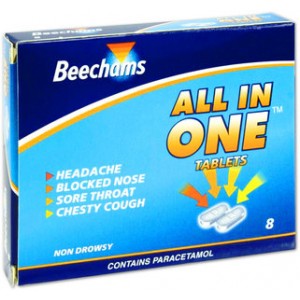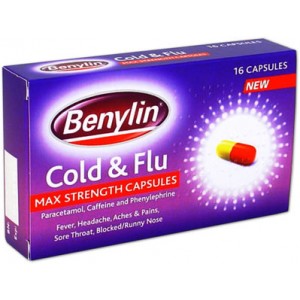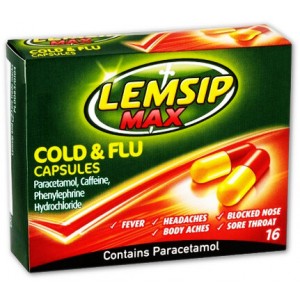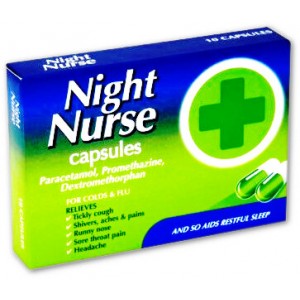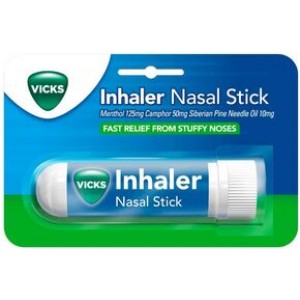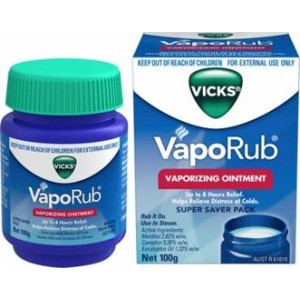Coughs, colds and flu
Coughs and colds can be debilitating and interfere with your daily life. With cold and flu treatment from Prescription Doctor, you'll get back to feeling as right as rain.
Beechams
- Relieves headaches and fever
- Soothes sore throat
- Clears nasal congestion
Benylin
- Reduces fever and pain
- Relieves blocked nose
- Treats dry and chesty cough
Lemsip
- Gets to work quickly
- Relieves cold and flu symptoms
- Available as capsules or drinkable sachets
Night Nurse
- Encourages sleep
- Relieves congestion
- Available as capsules or syrup
Vicks Inhaler Stick
- Relieves stuffiness
- Easy to use
- Dispatched from a UK based pharmacy
Vicks VapoRub
- Relieves congestion
- Applied topically
- Available from a UK registered pharmacy
Table of contents
What are coughs, colds and flu?
Coughs and colds are common during the winter months. They can come on quickly, causing a range of unpleasant symptoms, and disrupt your daily life.
Nobody likes battling a cold - luckily, there are a range of treatments which can help to relieve your symptoms and help you get on with your day. Choose from tablets, capsules, syrups and hot drink sachets to bring relief from your coughs and sniffles.
The common cold and flu belong to a group of viruses called coronaviruses. These viruses affect the respiratory tract. In most cases, the symptoms of a coronavirus are mild, equivalent to the common cold. However, for people with weakened immune systems or underlying respiratory or cardiovascular conditions, such as asthma or COPD, catching a cold can put them in grave danger. Moreover, influenza (flu) and even the common cold can be lethal in the ageing and at-risk population due to their weaker immune systems and possible underlying health conditions.
While a vaccine exists to prevent the flu, there is no such vaccine for the common cold due to the way the virus mutates in its host, nor is there a cure for either virus. These mutations in the virus's DNA are often referred to as "strains". Consequently, there is no cure for either the cold or the flu.
Luckily, the immune system of a healthy adult is strong enough to defeat the virus. However, symptoms will persist for as long as the virus is present in the body.
What are the symptoms of colds and flu?
The symptoms of the common cold and flu virus are very similar to one another, which can make it difficult to differentiate between the two. Despite their similarities, there are some differences which can help you to identify whether you have a cold or flu.
One key differentiating factor between the flu and the common cold is how quickly the symptoms develop. The onset of the flu is much faster than that of the common cold. You'll feel that you're coming down with a cold over the course of a couple of days, while the symptoms of the flu develop within just a few hours.
Moreover, a common cold typically only affects your nose and throat, while the flu will also impact your digestive system, resulting in gastrointestinal symptoms too.
Symptoms of the common cold include:
- Blocked nose
- Congestion
- Cough
- Headache
- Loss of sense of taste and smell
- Muscle aches
- Pressure in your ears and face
- Raised temperature
- Runny nose
- Sneezing
- Sore throat
Symptoms of the flu include:
- Body aches
- Diarrhoea
- Difficulty sleeping
- Dry cough
- Fatigue
- General malaise
- Headache
- High grade fever (38°C or higher)
- Lack of appetite
- Nausea
- Sore throat
- Stomach ache
- Vomiting
While the common cold is typically milder than the flu, a cold can be just as disruptive to daily life, depending on the individual. Though rare, the common cold can pose life-threatening under the right circumstances. In people with a compromised immune system, such as those with diabetes, asthma, HIV or cancer, the body can have a much harder time fighting the virus. This can leave the body vulnerable to other more serious respiratory conditions such as pneumonia.
If you are concerned about the risks of colds and flu, speak to your doctor. They will be able to provide you with actionable steps to take to mitigate your risk of contracting colds and flu, as well as information on managing your symptoms. If you have asthma, for example, your doctor will be able to offer advice on how you can manage your condition if the virus affects your asthma.
During treatment, it is better to isolate yourself by confining in a single room and avoiding contact with other people to prevent the spread of the infection. Regularly wash your hands throughout the day and use hand sanitiser to kill the germs on your hand.
Cold and flu treatments
Most treatments for the common cold and flu focus on relieving the symptoms, such as a sore throat, general muscle pain and sinus headache. There are a wide variety of different treatments and formulations, including lozenges and syrups, for a sore throat, as well as all-in-one treatments which aim to tackle all the symptoms, including aches and pains, congestion, sore throat, coughing and fatigue.
While treating a cold or flu, it is important to get plenty of rest and drink fluids, such as water, regularly throughout the day to give your body the best chance to fight the infection. If you can, try to eat at regular intervals throughout the day to keep your body fuelled. If you can't face a large meal, try a bowl of soup.
Can I buy cold and flu treatments online?
You can easily buy cold and flu treatments online from Prescription Doctor. We have a range of products from trusted brands, including Benylin, Beechams, Lemsip and Night Nurse. All items are delivered straight to your door in discreet packaging.
Cough syrups
Depending on the type of cough you are experiencing, cough syrups can provide fast and effective relief.
Productive coughs, also known as mucous coughs or wet coughs, are coughs which cause you to bring up mucus from the respiratory system. It is commonly associated with viral infections such as the common cold or flu.
Unproductive coughs, commonly called dry or chesty coughs, are usually a sign of an upper-respiratory infection but can also be caused by asthma, allergies, colds, flu and irritation of the throat.
Being able to identify which cough you have can help you source the most effective treatment for you.
Some cough syrups contain menthol (levomenthol) or liquorice extract, which can soothe the throat.
It's important to measure out the required dosage using a medicine spoon or a measuring cup. If you do not have one of these, speak to your pharmacist - they may be able to supply you with a medicine spoon or measuring cup. Some treatments come with a measuring cup affixed to the cap.
Using a kitchen teaspoon or tablespoon may provide you with the wrong dosage, resulting in taking too little medicine to be effective or too much medicine, leading to an increased risk of side effects.
Always read the label on the side of the bottle before taking the medicine. Always follow the dosing instructions on the side of the bottle and read the patient information leaflet.
Cold and flu drinks
Cold and flu drinks can provide the benefits of cough syrups with the benefits of traditional capsules and tablets. If you struggle with swallowing tablets, a hot cold and flu drink might be more suitable. If in doubt, speak to your doctor for advice.
Often available in a flavoured powder, which you mix with hot water, these treatments contain paracetamol to treat pain and fever and a decongestant called phenylephrine hydrochloride. Paracetamol helps to reduce the fever and relieve pain such as headaches and muscle pain, while phenylephrine relieves pressure in the sinuses.
Cold and flu drinks come in sachets. Simply dispense the contents of the sachet into a mug, add the required amount of hot water - you can also add sugar or honey to taste - and drink it. Instructions on how much water to use can be found in the leaflet supplied with the treatment. You should always read the supporting literature before taking any medicine.
Always read the ingredients listed in the PIL before taking cold and flu drinks. Some cold and flu sachets contain lactose.
Cold and flu tablets and capsules
Cold and flu tablets and capsules act similarly to cold and flu hot drink sachets. They contain a mixture of paracetamol and phenylephrine hydrochloride - a vasoconstrictor to open the airways and relieve congestion.
They work to relieve the typical symptoms associated with the common cold and the flu. Some capsules and tablets contain caffeine to help the medicine to be absorbed faster by the body. If you have been told to decrease your intake of caffeine, speak to a doctor or pharmacist for assistance.
Caution about Paracetamol
When taking treatments for cold and flu, it's important to be aware of the amount of paracetamol you are taking. You should not take more than 4000 mg of paracetamol (equivalent to 8 paracetamol tablets). Taking more than the recommended maximum can seriously damage your liver.
If you have or have had a liver condition, speak to your doctor for practical advice on taking paracetamol.
While it's easy to track how many tablets you have, it's not as easy to contemplate the same dosage when taking cold and flu drinks, which can contain up to 1000 mg (1g) of paracetamol. You will often find a warning on the side of the packaging or within the patient information leaflet supplied with the medicine, which will tell you not to take it with other treatments which contain paracetamol.
It is often recommended not to mix products which contain paracetamol. For instance, you should not take tablets of paracetamol between taking cold and flu drinks, which also contain paracetamol.
As a general guide, you should allow at least 4 hours to elapse between doses and avoid taking more than 4 doses over the span of 24 hours.
If you are unsure about how to take paracetamol or whether another medicine contains paracetamol, speak to your doctor or pharmacist.
Preventing coughs, colds and flu
There are very few non-invasive preventative measures to avoid catching a cold or the flu. The best advice is to regularly wash your hands with soap and water, and/or use a hand sanitiser throughout the day. By keeping your hands clean, you can prevent the spread of germs from infected surfaces to you and vice versa.
The virus can survive on surfaces, such as door handles and railings, and spread to you upon contact with them. While the flu virus can only live for up to 24 hours, the cold virus can live on a surface for a week. Moreover, viruses are more likely to survive on hard surfaces (metal, plastic, concrete) than soft surfaces such as clothing and soft furnishings.
With this in mind, it's important to keep surfaces clean using disinfectants. Wipe down doorknobs, worktops and other surfaces which come into frequent contact with hands using disinfectants such as bleach.
If you have a cold or flu, take precautions to prevent the spread to other people.
Cover your mouth and nose with a tissue when you cough or sneeze and discard the tissue in a bin immediately. Wash your hands or use a hand sanitiser after doing so.
Avoid coming into close contact with other people as much as possible to reduce the risk of passing on the virus to other people.
You should avoid sharing utensils, glassware, towels and toys with a person infected with a cold or flu.
If you are more susceptible to catching colds and flu, consider increasing your intake of vitamins by eating plenty of fresh fruit and vegetables or by taking a vitamin supplement. Speak to a doctor or pharmacist for advice on which vitamins you may benefit from.
Cold and flu myths
Myth 1: Antibiotics treat colds and flu
Antibiotics are only effective against bacterial infections. The common cold and flu are viruses, not bacteria.
Misusing antibiotics, such as using antibiotics to treat a viral infection, can lead to antibiotic resistance and detrimentally affect how effective they are at treating bacterial infections when you do need them.
Myth 2: Alcoholic spirits can treat the symptoms
Hot toddy and Jägermeister are commonly touted as effective treatments for a sore throat or blocked sinuses. Despite the grandiose amount of anecdotal evidence, it is unclear whether either drink are effective for treating coughs and sniffles.
Jägermeister was concocted as a cough suppressant and has been used medicinally throughout history. Similarly, hot toddy was a herbal cocktail which was used to treat coughs and sore throats.
On the one hand, cloves, honey, cinnamon, lemon and liquorice extract have been used for millennia to treat coughs and colds - many products available from chemists contain such ingredients.
Despite this, the alcohol content of these popular concoctions is likely to exacerbate your symptoms and make you feel worse. What's more is that said alcohol content is also likely to interact with other cold and flu treatments you are taking, increasing your risk of experiencing side effects.
If you are suffering from the symptoms of the cold or flu, you should avoid alcohol until you feel well again.
Myth 3: You only catch a cold when it's cold outside
While the cold virus is more likely to thrive and replicate in colder parts of the body, such as the upper-respiratory track and nasal passages, you can catch a cold at any point in the year. Moreover, due to a lack of vitamin D caused by decreased sun exposure in winter months, the immune system becomes more vulnerable to infections.
The cold weather also makes people more reluctant to venture outdoors. As a result, people reside indoors or take public transport. These kinds of environments are ideal for germs to spread due to the proximity people are confined. While they might not directly cause colds, they can contribute to your chances of contracting the virus.
There're similar myths which state that going out into cold weather while your hair is wet will cause you to catch a cold - again; this is false. While being wet in cold weather can lead to hyperthermia, it will not directly cause a cold.
Simply put, the common cold is caused by a virus, not a change in the weather.
Myth 4: Zinc can improve the recovery time of colds
Systematic reviews have hinted that Zinc might speed up the recovery from a cold. However, the risk of unpleasant side effects, the doubt of its effectiveness, as well as the simple fact that the common cold is a mild ailment which can be effectively treated in a short period makes recommending zinc to treat a common cold challenging.
Taking zinc regularly, or ensuring to consume enough zinc in your diet, can strengthen your immune system. As can Vitamin D, which is typically provided by exposure to sunlight.
Myth 5: Chicken soup is a cold and flu cure-all
Chicken soup is often touted as a "cold cure". While there have been several studies into whether chicken soup is effective at relieving a cold, there is little evidence to conclusively suggest it does.
But don't let the evidence stop you from enjoying your favourite soup.
Soups are packed with fibre, vitamins and protein, which are important for your body's immune system. They also contain a lot of water, which your body needs to keep hydrated. Having a slice of wholemeal bread can also provide your body with glucose, which your cells use for energy.
A bowl of nutritious soup can be a suitable substitute if you cannot face a full meal.
Authored & Reviewed By

Mohamed Imran Lakhi
MPharm - Lead PharmacistPublished on: 12/03/2020 Reviewed on: 28/04/2023
Fill simple medical questionnaire
Prescriber reviews consultation
Pharmacy reviews the order
Medication sent In discreet packaging
© 2013 - 2024 Al Muhsineen Limited. All Rights Reserved. Registered Pharmacy: 34 Halliwell Road, Bolton BL1 8RL. Registered Office: 254 First Floor, Shearbrow, Blackburn, England, BB1 8DS

